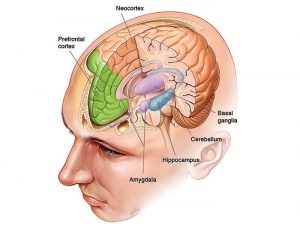Why do you have bad memory?
Did you start memory slipping? This can be a little alarming! Do you feel like you need memory booster? You may first see memory slipping in your 40s, or even younger, with memory loss symptoms like slower facial recall or where you left your things. “What groceries I supposed to buy? OMG! I forgot the grocery list at home!”. You may walk into a room, then you can’t remember why you are there. This is a situation we experience often. Also, you occasionally misplace items like keys, glasses, or remote control. You ask:”is it alarming?”
Memory slipping or fading can happen at all ages. Bad memory is frustrating and can be scary. Memory problems can be age or lifestyle related.. But, they are more related to lifestyle habits than age. Knowing the difference between normal and serious memory problems is important.
Where are memories stored in the brain?
Do you know that your memories are not stored in one part of the brain? Different memory types are stored in different brain regions.
1-Explicit memories – which are about events that happened to you (episodic), as well as general facts and information (semantic) – will stay in three areas of the brain: the hippocampus, the neocortex and the amygdala.
2- Implicit memories, such as motor memories, rely on the basal ganglia and cerebellum.
3- Short-term working memory relies most heavily on the prefrontal cortex.
Do you need Natural Memory Booster?
To forget things on occasion is normal. While forgetting things repeatedly is an alarming sign. It’s important to keep your brain active. There are natural ways good as memory boosters. Give your brain a good workout daily, just like a muscle.
1-Use it or lose it! Master a New Skill
Your brain needs a workout just like the rest of your body parts. So use your brain every day. Try crosswords, read a section of the newspaper you’d normally skip, take a different route to work, learn another language or how to play music. Purposeful activities stimulate your neurological system, oppose the bad effects of stress, reduces the risk of very bad memory and enhances health and well-being
2-Socialize often
See Your Friends. Depression and stress can both lead to memory loss. So, try to socialize often and do not live alone. Life gets better when you do.
3- Organize Your stuff!
If your life is not organized, you will likely forget stuff. Put int o to do lists things you need to do. This can be a notebook or calendar. There many mobile application that are of great help. Use any of them to write down what needs to get done.
4- Stay focused
For example, you’re talking on your phone, getting out of your car and carrying some items. Then you put down your car keys. You are likely to forget where you left the keys.
While you are ona subject, try to stay focused on the task at hand and limit distractions. You’re more likely to recall information if you concentrate specifically on that rather than multi-tasking. Multitasking may actually slow you down, make you prone to errors as well as make you forgetful. But another way, focus on what you want to remember later and you’re better to remember it quickly.
5- Sleep Well
Losing one night of sleep can affect your mental performance as much as being drunk! You need seven to eight hours of sleep each night. You should make time for adequate rest, go to bed earlier. Your memory will be fresh enough to remember stuff the next day.
6- Eat Healthy
A diet high in sugar and unhealthy trans fats can put you in a brain fog and leave you feeling anxious or depressed. Your memory likes healthy living, including your diet. You need plenty of fruits, vegetables and whole grains. Low-fat protein, like fish and skinless poultry, are adviced. Increase your water intake, and decrease alcohol intake. Healthy food is required for the brain to get the nutrients it needs. Brain use the nutrients to build up its cells and the brain chemicals that are required to control memory.
7- Exercise Daily
At least 30 minutes of moderate aerobic activity (like walking) each day, or 30 minutes every other day of intense exercise, like jogging or weight lifting. Exercise encourages your brain to work at optimum capacity by stimulating nerve cells to multiply, strengthening their interconnections and protecting them from damage. Also, it boosts blood flow throughout your body. During exercise nerve cells release proteins known as neurotrophic factors. One in particular, called brain-derived neurotrophic factor (BDNF), triggers numerous other chemicals that promote neural health, and directly benefits cognitive functions, including learning.
8- Seek medical advice
Chronic conditions can affect your memory, to say nothing about the rest of your health. So follow your doctor’s recommendations, be it for depression, your kidneys or anything else in your medical history. Review your medications often with your doctor as well. Some medications can reduce your memory.
Bottom line
You can improve your memory by getting enough quality sleep, eating healthy diet, and taking active measures to reduce stress. Also you may opt to take some natural memory boosters.
There are many natural memory supplement. They can help fuel your brain. Look for one that has Neotropic like cognizine, vinpocetine and ginkgo biloba. These are clinically proven to increase alertness and blood flow in your brain.
Combine a natural memory booster with the memory-boosting tips I have discussed in this article, and you really do have an advantage.



